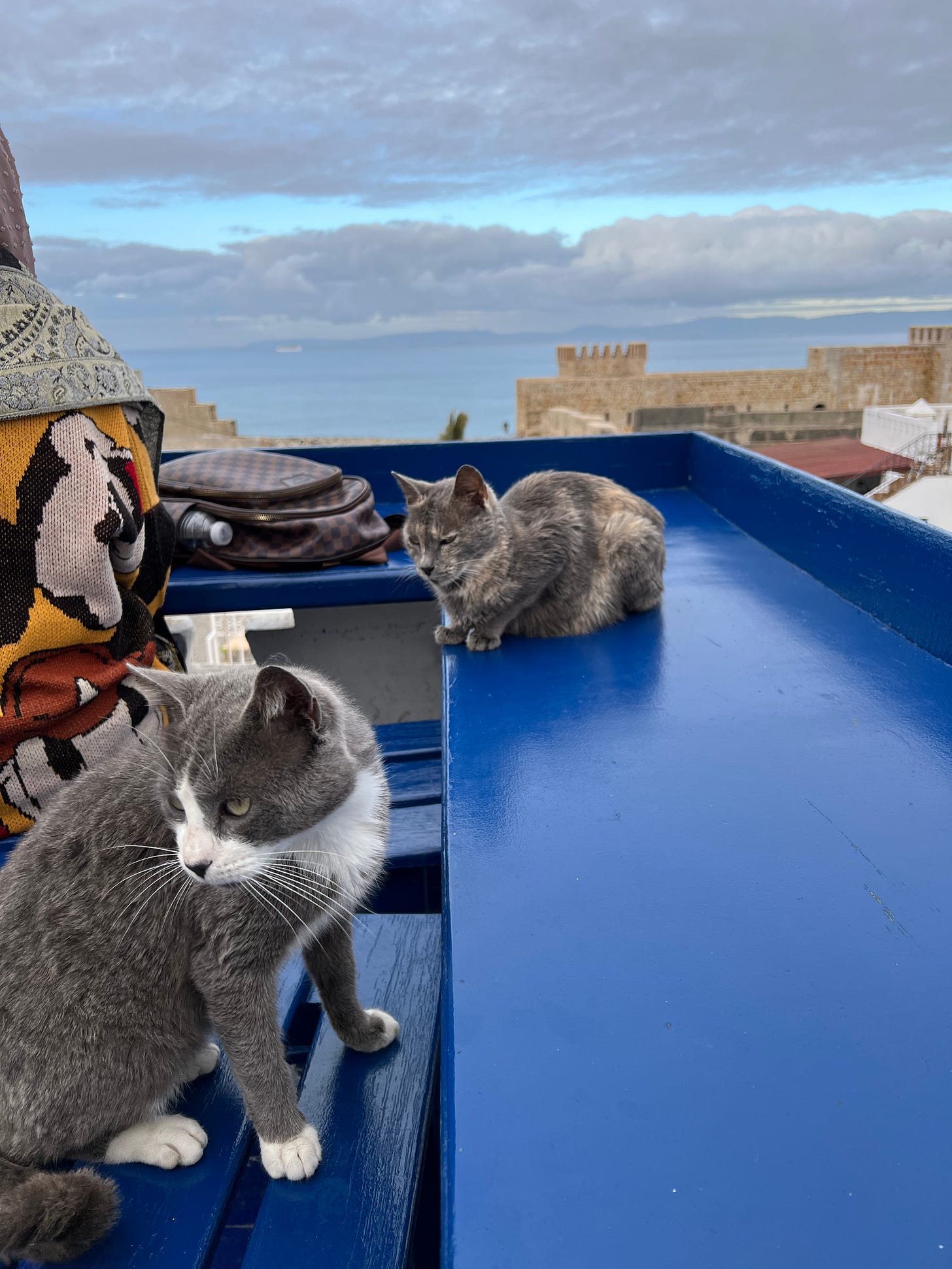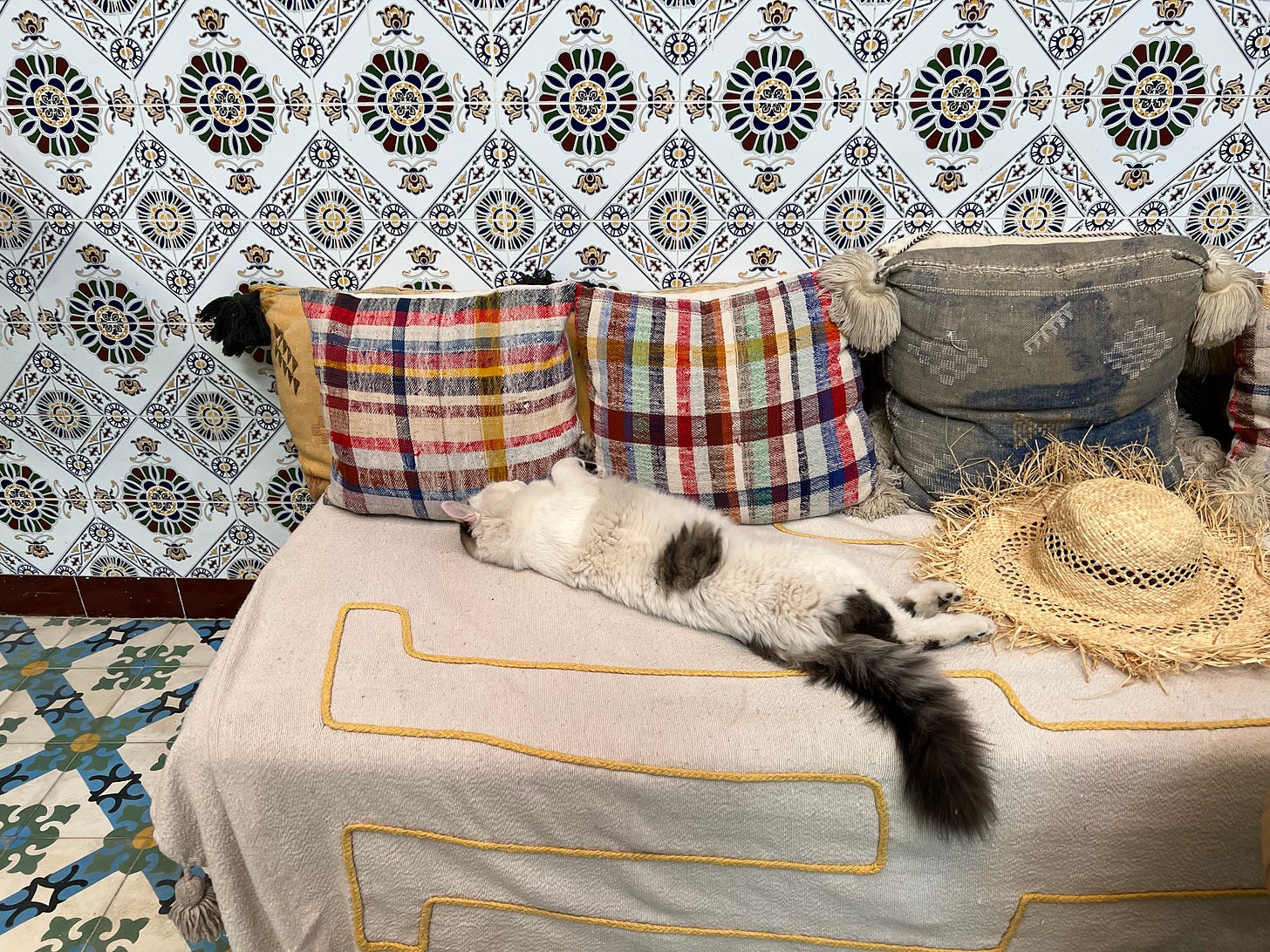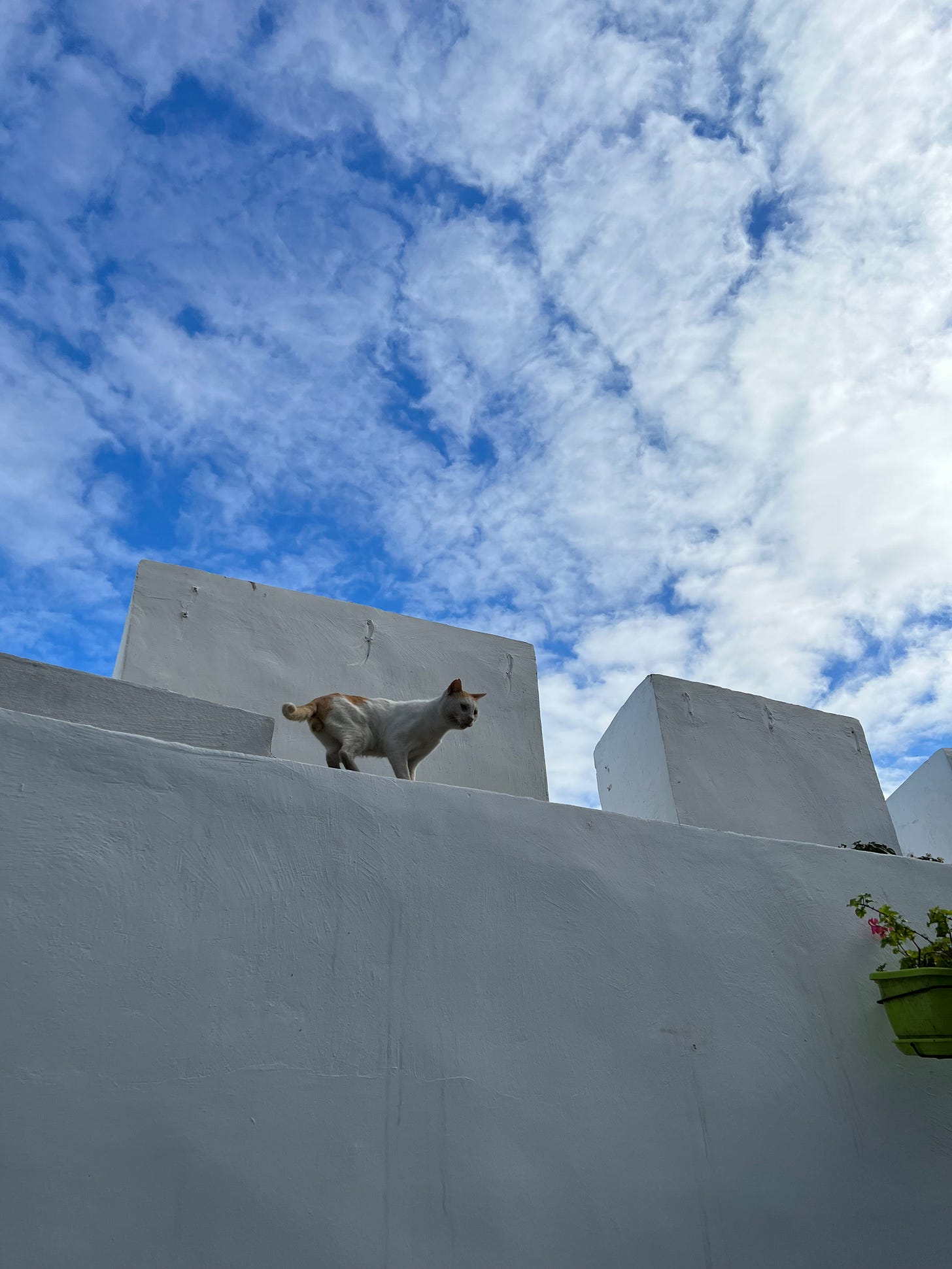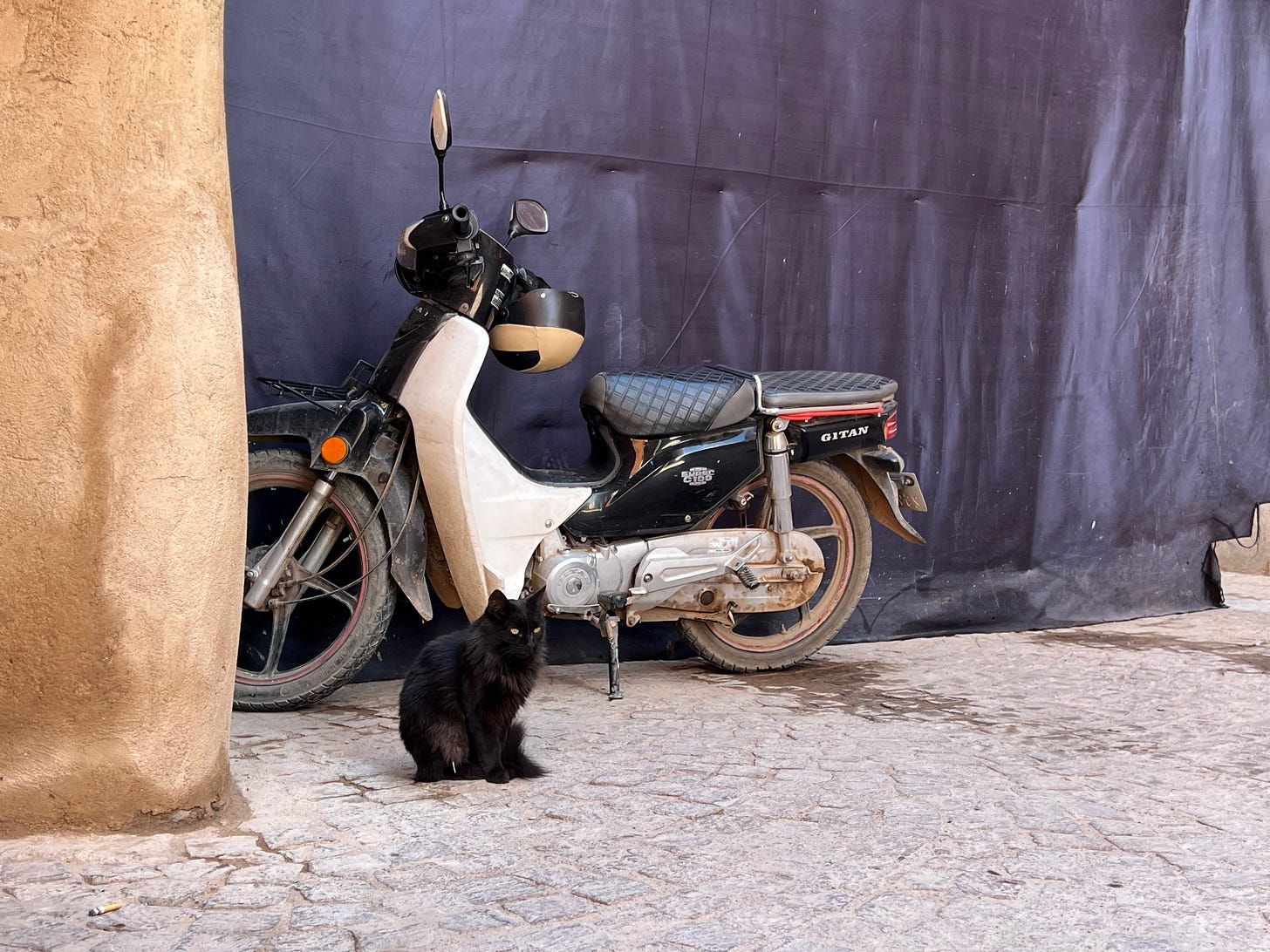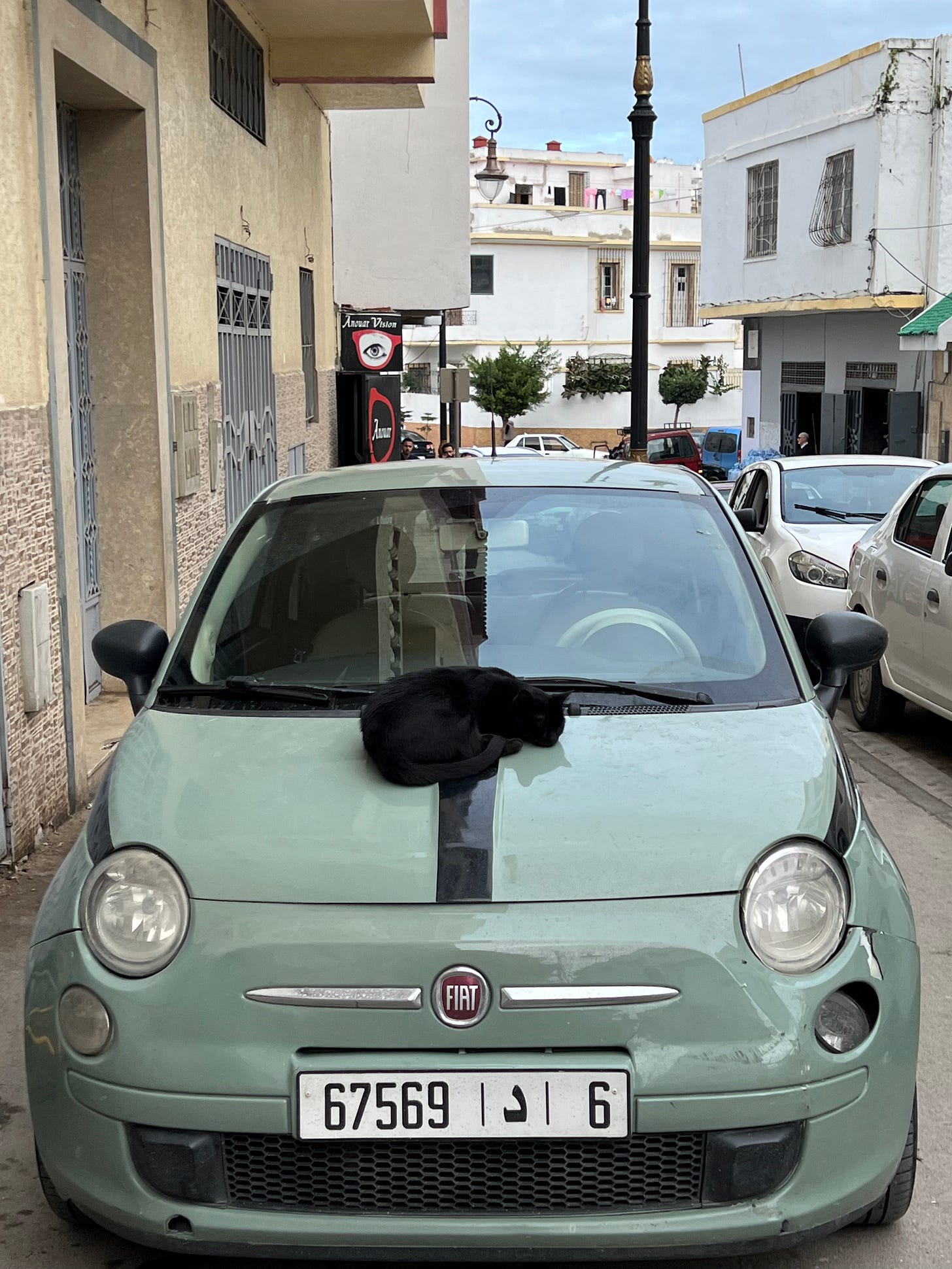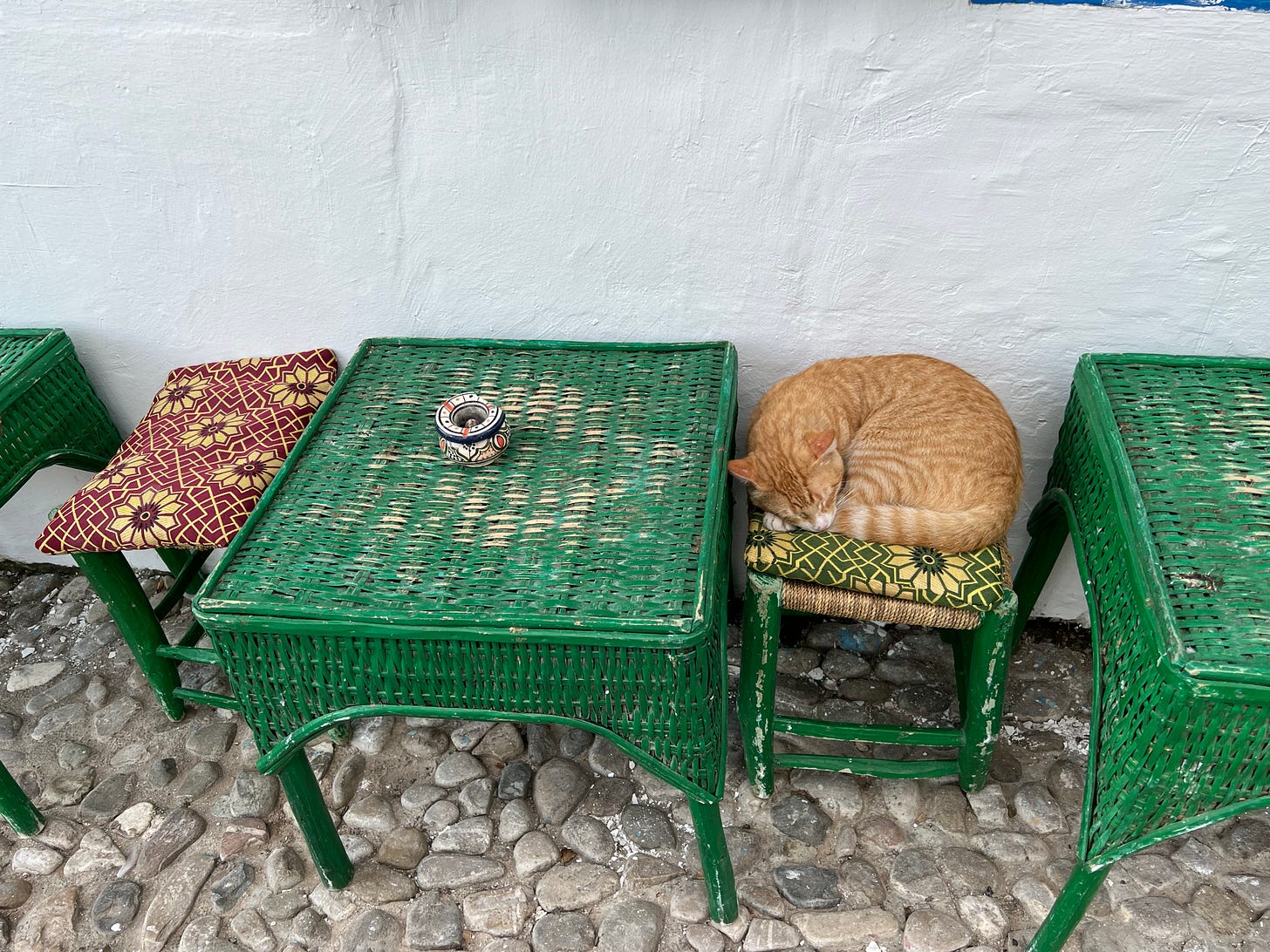The Many Cats of Morocco
Travel, writing, the Christmas Spirit, the Beautiful Game
I just got back from a two-week trip to Morocco.
There were cats everywhere.
I think most writers with even a minimal sense of adventure have dreamed of doing travel writing in some capacity. The romanticized ideas of having glorified vacations paid for by some well-off magazine, being sent to far-flung corners of the world to experience new food, architecture, art.
To go on adventures professionally, really. It sounds awesome.
But, just like the idea of music writing that Almost Famous sold to scores of impressionable kids with eclectic iTunes libraries, the idea of travel writing doesn’t really exist in the way we imagine, does it?
I think most people my age who think about travel writing, or any sort of travel content creation, thinks of Anthony Bourdain first. I’m hardly the first to say that Bourdain is the gold standard when it comes to this medium.
There’s a reason he and Vice appealed to so many people. (The two also did quite a lot for the Clarks Desert Boot.)
Bourdain broke down the exotic nature of travel writing, serving as a gritty reboot of travel content in a way. There was no starry-eyed wonderment. The charm came from his deadpan, almost annoyed-to-be-there delivery, but his embrace of the cheap, simple and possibly illegal.
What Bourdain did so well was show that most places in the world are the same to some extent. They’re full of people who enjoy eating, whether it’s a Michelin Star meal made from ingredients foraged in the Danish wilderness, or cobbled together in a shabby home kitchen. They like to laugh, they might like to drink, they have families and jobs and hobbies. He did a great service helping people (read: Westerners) to stop being afraid of the places the media told us to be afraid of, especially places that spoke Arabic.
But, like Vice, that “anyone can do journalism if you have a phone and internet connection” mentality spread to travel content, and gave birth to the bloggers and vloggers that you see when you google a destination. Self-certified experts and expats who walk around the streets with a GoPro and huge backpack and have an Instagram name like “BackpackingOnaBudget.”
Often when I watch these videos, they all bum me out in the same way: These people were clearly being given guided tours, and paused between bits of information to regurgitate what their local guide just told them into the camera, as if they had researched it themselves or always knew it. They also treat locals like zoo animals, looking into the camera and explaining “OK, I’m about to haggle with this guy over this leather bracelet. Watch this.” Like Steve Irwin explaining he’s about to pounce on a snake. Just like the guy on film, the snake is just going about its business and didn’t ask to be in someone’s video today. The difference is that the snake doesn’t speak multiple languages and understand everything you’re saying.
They also act like every bite of food is the most delicious thing they’ve ever had, whereas Bourdain was content saying “that’s good.” But he meant it. It’s perfectly fine for something to be pretty good.
It’s hard to find a better unifier than soccer. It’s the beautiful game, in my opinion.
Being in a country during its World Cup run is special. Even I wasn’t sitting down to watch a match, I was fully aware of what was happening thanks to the fact that literally every street vendor had the game on their phones or a TV or a radio. It was impossible to ignore. It didn’t matter who was playing. The game was on.
I was walking around Marrakesh after Morocco drew 0-0 with Croatia in their opening match. Every minute or so, hoards of people on motorbikes waving flags and blowing vuvuzelas roared past. This happened for hours.
As an outsider, on this day, it felt like a largely inconsequential match and also an overachievement by Morocco. A fluke. The rest of the tournament would show that this Morocco team means business, having escaped their group and knocked out Spain in the round of 16.
The thing with Morocco’s run is that there’s much more than just Moroccan people pulling for them. They celebrate with a Palestinian flag after games. The idea of a unified Arabic world (and last African country standing) proving itself against Western countries that have made their existences hell for much of history, giving the world a reason to celebrate a country it often doesn’t think about or can’t place on a map, showing it can do all of the things the traditional favorites like Spain and Belgium can do, is not lost on the common people on the street.
Being a taxpaying Philadelphian, you know I love me some celebrating in the streets. It honestly made me feel at home on a trip where that feeling was rare.
It’s hard not to be romantic about a sport that prompts hundreds of high-speed parades and dancing in the street after a 0-0 tie in an opening match.
I could’ve made a photo series of the different soccer “fields” that dotted the country, too. I lost track of how many goalposts stood alone in random fields from Fes to the desert town of Merzouga. Some were real goals, some where a collection of three branches.
That’s partially why it’s so exciting to see a country like Morocco win at this level. It’s not a guarantee that they walk this far into the World Cup, and it means a hell of a lot for the kids kicking a ball between three branches on the side of a desert highway to know that they’re capable of that, too.
World Cup aside, soccer was really everywhere. If I had a dollar for every PSG shirt I saw on the street, I could retire now. I also saw bags of Neymar-branded potato chips, but the picture was him playing for Barcelona. So those chips were not fresh.
Soccer is the unifier. But the means of watching soccer is not the same everywhere.
Being a Muslim country, bars are not as ubiquitous as they are here or in Europe. You have to seek them out. That means that sometimes you end up in a bar called London’s Pub in Tangier, which reviews that you practically read in a British accent claim has a “proper pint.” And when you get there, it’s smokey and dimly lit, with purple neon lights making it feel much more like a failed nightclub than the places I’m used to watching soccer. Despite reviews that promise Western liveliness, the vibe for USA - England was sullen. Lots of stoic dudes at the bar.
And it’s pretty much all dudes.
Places like this seemed to be where the Westernized youth of cities like Tangier go to act against the indoctrinations of their country’s traditional ideology. So, you’d see a few girls in more revealing clothes, drinking alcohol, watching TikToks, but also receiving side-eyes and glares from some of the older male clientele.
I always do my best to keep my Americanism to myself on vacation as much as possible. This meant not celebrating the US tying England 0-0 (but the camaraderie between my country and my host country was not lost on me).
Sometimes tying is really winning. But it’s also good not to be an obnoxious tourist. So I didn’t wave a flag on any motorbike or dance in the street. I just ate some fried food and went to sleep. USA!
Walking around Tangier, I thought a lot about the role the city played in writing’s and writers’ histories. Beat writers like Kerouac, Ginsberg and Burroughs spent time there. I thought about the idea of traveling somewhere different to do your writing in a new environment. Back then it was an escape, when it was still possible to hide and disappear completely, often from the US government. People romanticize that idea of these literary hubs, where the great writers pounded away at their typewriters, blind from drinking and cigarette smoke. Stories of spies and espionage in exotic locales. People love “After Midnight.” They could do a sequel of Owen Wilson “Oh wow”ing across mid-century Tangier.
I remember a few years back Amtrak did a promotion where writers could ride from the East Coast to Chicago, for nothing else than just using the travel to focus on their writing. It’s a lot less sexy than a bohemian lifestyle in Tangier or Paris, but it sounded nice.
I don’t think younger generations feel that same pull toward the Beats and their boozy adventures, though.
The kids are drinking less than older generations, on the whole. So maybe that deification of the tortured, substance-abusing writer will disappear over time, too. “On the Road” won’t hit like it used to, and fewer kids will feel charmed by Hunter S. Thompson.
To continue my comparison of writers of the past to the content creators of the day, I think the modern writer in exile is someone who calls themselves a “Cyber Nomad” and stays at nice AirBnB’s or purposeful communities in Nicaragua, and spends 6 hours a day sending emails for their brand marketing business.
I’ve traveled over Thanksgiving a lot. It turns out international flights out of the U.S. are often pretty cheap that week.
The trade off is that, on this trip, I missed the beginning of the Christmas run-up.
As a kid, my family didn’t really start ramping up the Christmas Spirit until like the second week of December when we’d get our tree. But when we did, the halls were fully decked. My mother loves a theme.
As I got older, and lived away from my parents, I’d still decorate but never fully dove in.
Last year, as I was going through chemo, I had a weird Christmas epiphany that it doesn’t just happen. I suddenly related to all of the Christmas movies where a parent goes above and beyond to make the whole thing magical - and not just in the way of buying presents.
Between that epiphany and the sweet tooth chemo gave me, I started baking cookies on a regular basis. I’d cue up a Christmas movie every night when I finished work. I fully became a Christmas Guy.
Maybe it was a distraction from the throes of cancer treatment, and I chose Christmas as a way of forcing some positivity into my life. I think more it was just another rite of passage of growing up, realizing that things like Christmas don’t just happen. Coincidentally, my mom also said when referring to chores in the house that “The elves didn’t just do it.”
In adulthood, the elves don’t make Christmas happen. You do. And even now that I’m cancer-free, I still have the lingering spirit that came over me last year.
There’s a point to that story beyond telling you that I like watching even the shittiest Christmas movies now, like that new Netflix one with Lindsay Lohan that feels like a movie Jenna would star in in “30 Rock.”
As I’ve gotten older, I’m a little more aware of the positive lessons I can glean from things, and how exposure to certain things can last and become a part of you.
To bring things back to travel, going somewhere new can imprint itself onto you without you even being conscious of it. Maybe after eating a certain way on vacation, you start to integrate that kind of diet into your regular routine.
Maybe after a trip to Morocco, where everywhere you go you are offered tea and probably bread, you think about how you can be more hospitable to your own friends back home, always having a pot of coffee and some snacks to offer people.
You think about how even in a country with more strictly enforced traffic laws, it’s still a good idea to look both ways before you cross the street and be really damn sure no one is zooming up on a motorcycle.
After having to barter for every consumer product and service, you can start to think about how you can be more assertive in your own life and fight for what you think is fair and deserved.
If you miss the 2:00 train from Tangier to Fes, there will likely be another one. It might be a little slower, and you might have a moment of panic when the old man next to you explains in French that you have to get off at a different station and transfer, but then a helpful woman asks the conductor for you in Arabic and confirms that you’re on the right train and not to worry. Her husband, with glasses that magnify his eyes so he looks like a Pixar character, says “Welcome Morocco,” and they leave the train. It wasn’t the train you wanted to be on at first, and the ticket machines didn’t accept your American credit card and caused you to lose your head a little bit, but it got you there.
Most importantly, especially this time of year, find commonalities with people around you.
And watch some soccer.
At the heart of any travel writing, whether it’s in an old guide book or an Instagram account, is the belief that your point of view and what you have to say is important. So, maybe I do have what it takes.
Every time I’ve gone on vacation to another country, or even just another city within the U.S., I’ve tried to pay attention to what the locals do. They know where the real good food is, not the overhyped spot. They know where the good bar is, not the place that charges too much for a specialty cocktail or has employees in period garb.
In Morocco, I found that life was often overwhelming. The ancient Medina streets always crowded with people buying, selling, cooking, eating. There’s a good chance of being taken out by motorbikes or even donkeys. It’s hard to focus in and see what life is really like when life is moving so quickly. And like I said up top, most people are just going about their day. They’re drinking coffee, getting groceries, setting up shop, waiting for a bus. They’re in McDonald’s, which, while it’s appealing to try the special menu items you can only get in that part of the world (like a chicken Big Mac), isn’t particularly interesting or noteworthy to me.
So, I chose to focus on the locals in a different way, taking time to notice each cat I saw. Maybe even thinking about the little adventures or mundane daily routines they have.
And as I thought about the way we document travel anymore, I thought about how I could leave some sort of report from my own trip. Though I think I landed on a few insightful pieces about hospitality, the global love of soccer, etc., really I knew I could use the internet for its most common function:
Cat pictures.
Today’s Snakes and Sparklers musical guest is Kevin Devine.
Thanks for reading! I’m planning on keeping this going as a fun creative outlet 2023, so please consider subscribing and telling your friends about this blog.






